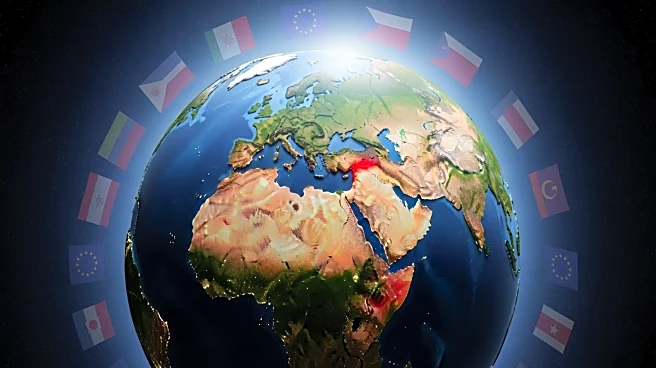What's Happening?
President Trump recently participated in a summit in Sharm el-Sheikh aimed at ending the Israel-Hamas War. During this summit, Trump reportedly sidelined European leaders, opting instead to engage directly with Arab leaders to broker peace. This move
is seen as a significant shift in the traditional dynamics of Middle Eastern diplomacy, where European powers have historically played a substantial role. The summit has been described by some European observers as a 'humiliation ceremony,' highlighting the diminished influence of Europe in the region as Trump took center stage in peace negotiations.
Why It's Important?
The actions of President Trump at the Sharm el-Sheikh summit underscore a potential realignment in Middle Eastern diplomacy, with the U.S. taking a more direct role in peace efforts. This development could have far-reaching implications for U.S. foreign policy and its relationships with both European allies and Middle Eastern nations. By bypassing European involvement, Trump may be reshaping the geopolitical landscape, potentially leading to a new era of U.S.-led initiatives in the region. This shift could affect European strategic interests and their historical influence in Middle Eastern affairs.
What's Next?
The outcome of the summit and Trump's approach may prompt European leaders to reassess their strategies and diplomatic engagements in the Middle East. It remains to be seen how Arab leaders will respond to this new dynamic and whether it will lead to lasting peace in the region. Additionally, the U.S. may continue to pursue similar diplomatic strategies in other geopolitical contexts, further altering traditional alliances and power structures.
Beyond the Headlines
This development raises questions about the long-term implications of U.S. unilateralism in international diplomacy. The marginalization of European powers could lead to tensions within transatlantic relations and prompt discussions about the future role of multilateralism in global conflict resolution. Furthermore, the ethical considerations of sidelining traditional allies in favor of direct negotiations with regional powers may become a topic of debate among international relations experts.

















